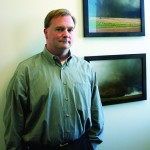
What you might not often see or associate with the eco-conscious movement is the practical, conservative business man – the person who sees sustainability as simply good business. Enter Jay Antle.
Antle is the director of the Center for Sustainability at the college. The department’s mission is to incorporate sustainable values and practices into the college’s community.
Although fairly new to the college, the center has already helped bring several sustainable projects online. The storm water drainage project, the college’s farm, and solar powered trash compactors and recycling units are all projects that provide economic benefits to the college but also serve as extended classrooms of sustainable practices for students.
Antle is also a professor of history at the college. He’s currently teaching a six hour course. It’s a “learning community,” combining Antle’s U.S. History survey course with a Composition II course.
The capstone project for the course is a family history paper in which students interview relatives who have participated in major U.S. historical events. By getting first-hand information about the country’s previous wars and social movements, students are able to integrate historical events with their family history and perhaps reveal connections they wouldn’t normally make.
The course is an example of how factual textbook material is connected to real people and real lives. That, Antle says, is how we bring sustainability out of the purview of scientists and politicians and into regular peoples’ lives.
“Even if you don’t believe in climate change … In the next century, there will be maybe a billion people on the planet who will want the same quality of life that we have now,” Antle said. “We would need six or seven earths to accomplish that. We have to learn to do things cleaner, simpler and more efficiently. We have to do this regardless of what you think about global warming.”
Efficiency, Antle says, is the ultimate goal of sustainability. He doesn’t believe that there must be a choice between what is good for the economy and what is good for the planet.
“It’s about making the organization more efficient and making people more conscious of the choices they make,” he said. “It’s about revealing connections.”
Antle’s dedication to sustainability comes from his understanding that all of our actions, our purchases and our day to day activities are the result of a multitude of processes that we don’t see but can have profound effects on the environment.
He grew up in the petrol-industrial town of Baytown, Texas. He remembers explosions from the nearby petroleum facility occurring regularly. At times, he said, they were so intense that they actually rattled windows and blew in the family’s garage door. In contrast, he spent summers involved in environmental efforts, volunteering at Yellowstone Park and the Grand Canyon. It opened his eyes to the beauty of untamed nature and inspired him to challenge the idea that nature has to take a back seat to progress.
Whether teaching environmentalism or simply enjoying the raw beauty of nature as an amateur storm chaser, Jay Antle has strived to educate and inform the college’s community that sustainability is about progress, efficiency and stewardship. It’s about having the best possible quality of life in the most cost effective, environmentally conscious way possible.
Kim Criner, Sustainability Student Affairs coordinator, identifies Antle as a leader and risk taker.
“Jay believes in what he does and he’s willing to take risks,” Criner said. “It’s not just a job for him to make [the college] a leader in sustainability.”
Antle says in the future, the best possible scenario is one where the need for a center of sustainability simply doesn’t exist.
“Ideally, twenty years from now you don’t need me,” he said. “What we’re doing, everyone is doing on their own.”
Contact Julius Williams, staff reporter at [email protected].





















